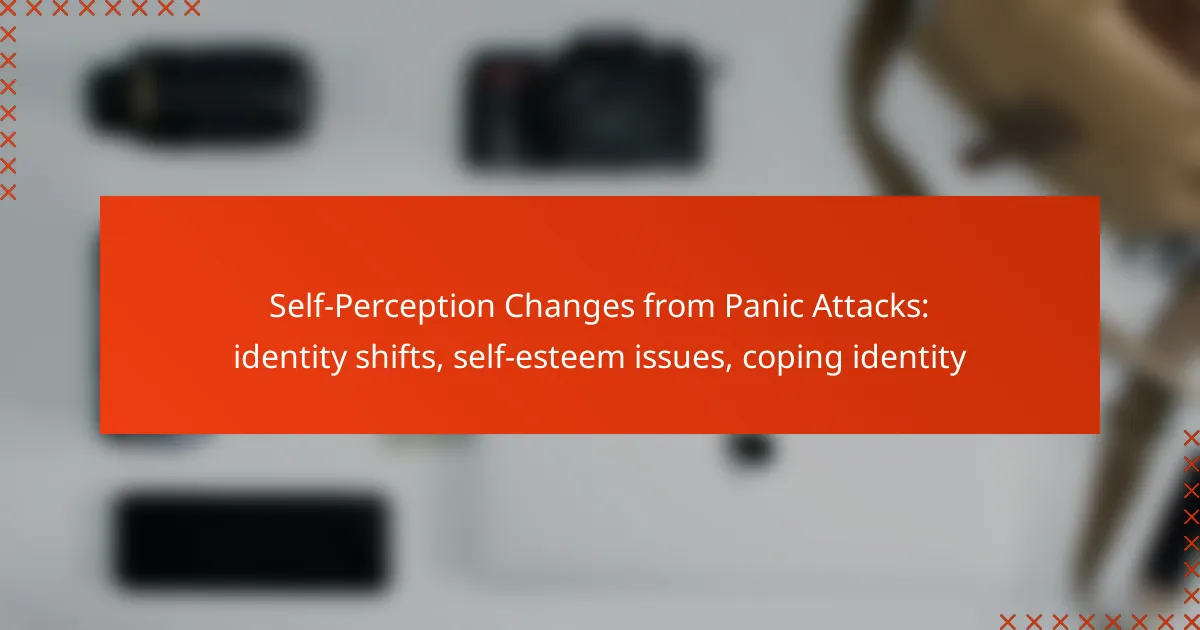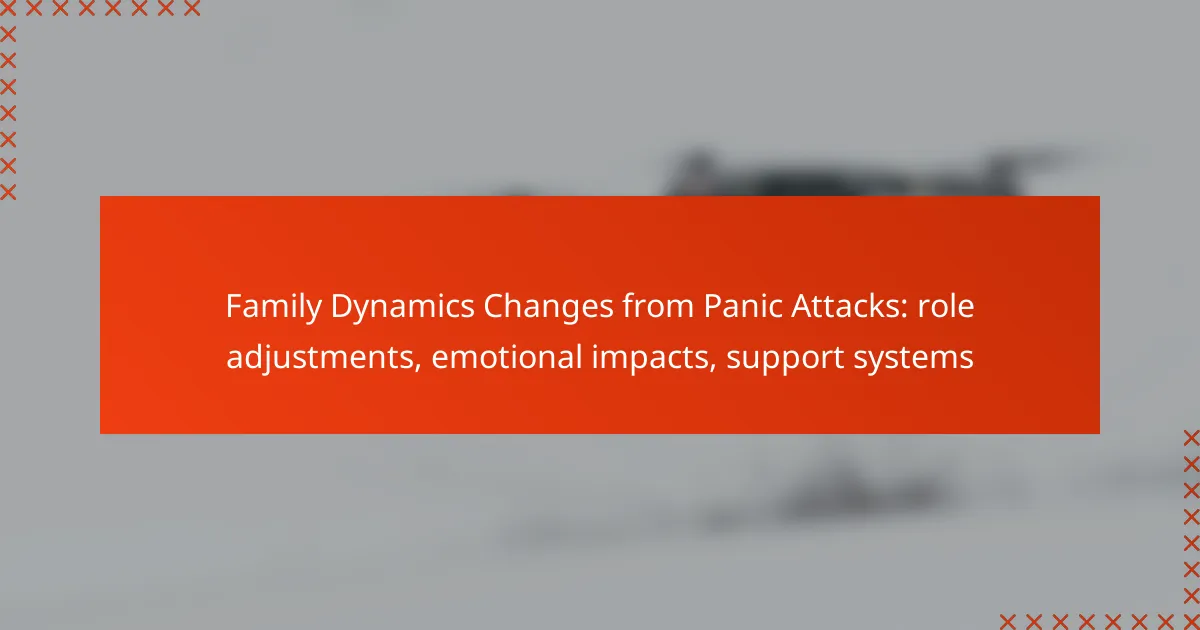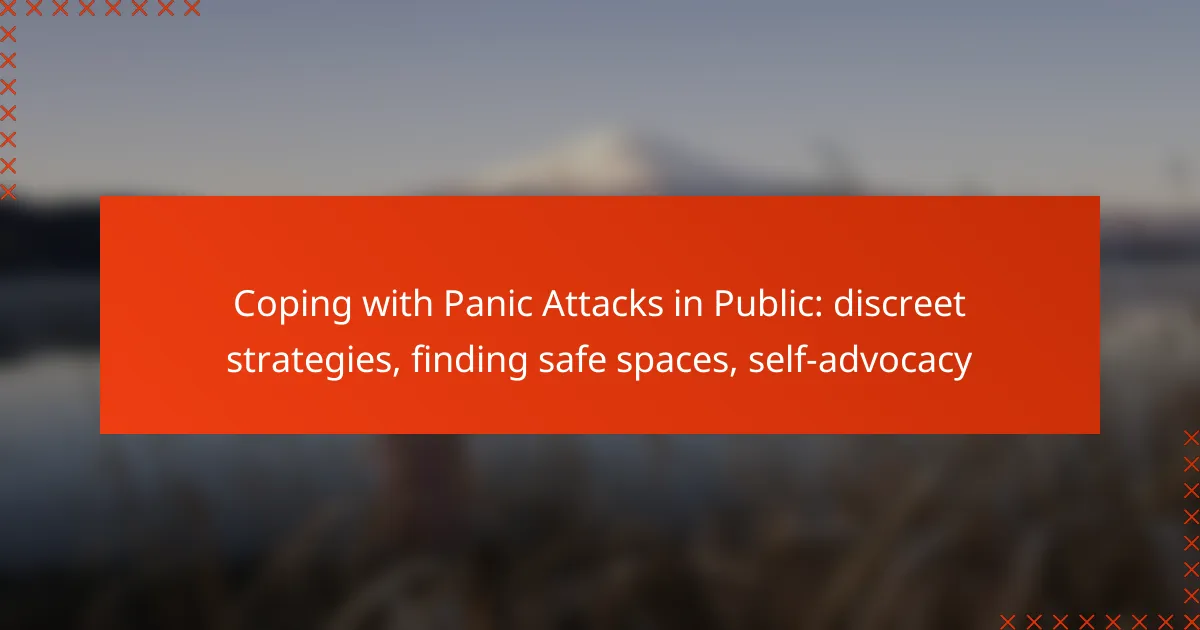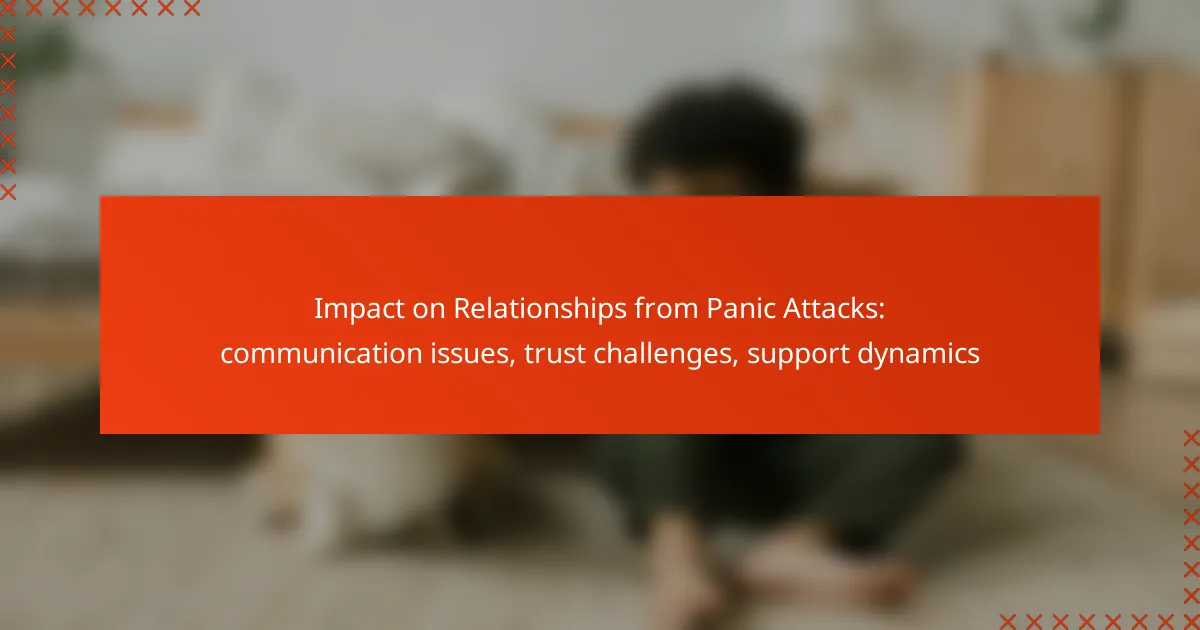Panic attacks can profoundly impact an individual’s self-perception, leading to significant shifts in identity and self-esteem. As people grapple with anxiety and fear, they may find themselves disconnected from their former selves, struggling to navigate daily life. However, implementing effective coping strategies can help reshape thoughts and foster a more positive self-image, ultimately aiding in the rebuilding of self-esteem and identity.

How do panic attacks affect self-perception in the UK?
Panic attacks can significantly alter self-perception, leading to shifts in identity and self-esteem. Individuals may experience a disconnect from their previous sense of self, often feeling anxious or fearful about their ability to manage daily life.
Identity shifts during panic attacks
During panic attacks, individuals often feel as though they are losing control over their identity. This can manifest as a sense of detachment from oneself, where familiar traits and behaviors seem foreign or unrecognizable. The fear of experiencing another attack can lead to avoidance of situations that once felt comfortable, further complicating one’s sense of self.
For example, someone who was once outgoing may become withdrawn, fearing that social interactions could trigger panic. This shift can create a cycle of anxiety, where the individual feels increasingly disconnected from their former identity.
Impact on self-esteem
Panic attacks can have a detrimental effect on self-esteem, often resulting in feelings of inadequacy and self-doubt. Individuals may internalize their experiences, believing they are weak or incapable of handling stress. This negative self-perception can lead to a decline in confidence and an increased fear of future attacks.
To combat this, it is essential to practice self-compassion and recognize that experiencing panic is not a reflection of one’s worth. Engaging in positive affirmations and seeking support can help rebuild self-esteem over time.
Changes in personal relationships
Panic attacks can strain personal relationships, as loved ones may struggle to understand the experience. Friends and family might feel helpless or frustrated, leading to misunderstandings and emotional distance. This can create a sense of isolation for the individual experiencing panic attacks.
Communicating openly about feelings and experiences is crucial in maintaining relationships. Encouraging loved ones to learn about panic attacks can foster empathy and support, helping to bridge the gap created by these experiences.

What coping strategies can improve self-perception?
Effective coping strategies can significantly enhance self-perception for individuals experiencing panic attacks. These methods focus on reshaping thoughts, fostering mindfulness, and building supportive communities.
Cognitive Behavioral Therapy (CBT)
Cognitive Behavioral Therapy (CBT) is a structured approach that helps individuals identify and challenge negative thought patterns associated with panic attacks. By reframing these thoughts, people can develop healthier self-perceptions and reduce anxiety.
CBT typically involves weekly sessions lasting about 45 to 60 minutes, where therapists guide clients through exercises and homework assignments. This process can lead to improved coping skills and a more positive self-image over time.
Mindfulness and meditation techniques
Mindfulness and meditation techniques encourage individuals to focus on the present moment, reducing anxiety and enhancing self-awareness. Practices such as deep breathing, body scans, and guided imagery can help calm the mind and improve self-acceptance.
Incorporating mindfulness into daily routines can be simple; even a few minutes of focused breathing or meditation each day can yield benefits. Apps and online resources are available to help beginners establish a consistent practice.
Support groups in the UK
Support groups in the UK provide a safe space for individuals dealing with panic attacks to share experiences and coping strategies. These groups foster a sense of community and understanding, which can be vital for improving self-perception.
Many support groups are facilitated by mental health professionals and meet regularly, either in-person or online. Participants often find that connecting with others who share similar struggles helps them feel less isolated and more empowered in their recovery journey.
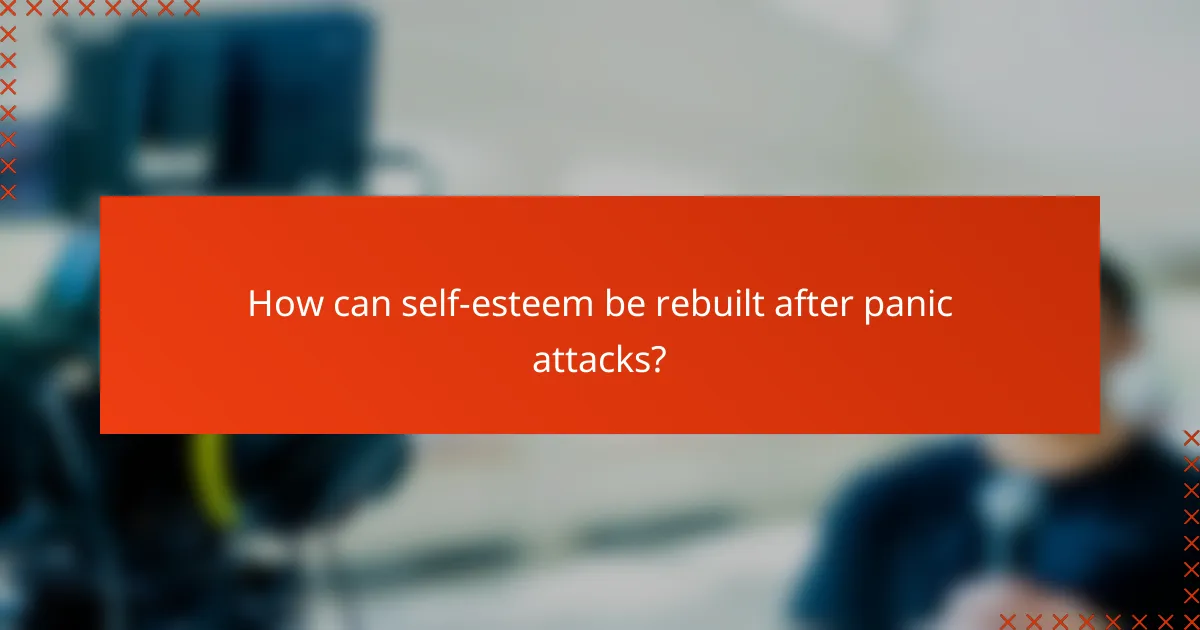
How can self-esteem be rebuilt after panic attacks?
Rebuilding self-esteem after experiencing panic attacks involves recognizing and addressing the negative self-perceptions that may arise. This process often requires a combination of practical strategies, emotional support, and personal reflection to foster a healthier self-image.
Setting realistic goals
Setting realistic goals is essential for rebuilding self-esteem. Start by identifying small, achievable objectives that can be accomplished daily or weekly, such as taking a short walk or practicing mindfulness for a few minutes. These incremental successes can help restore confidence and a sense of control.
Consider using the SMART criteria—Specific, Measurable, Achievable, Relevant, and Time-bound—to structure your goals. For example, instead of aiming to “feel better,” set a goal to “practice deep breathing for five minutes each day.” This clarity can enhance motivation and track progress effectively.
Positive affirmations
Positive affirmations can significantly impact self-esteem by countering negative thoughts associated with panic attacks. Create a list of affirmations that resonate with you, such as “I am capable of handling challenges” or “I am worthy of love and respect.” Repeat these affirmations daily to reinforce a positive self-image.
Consistency is key; try to incorporate affirmations into your morning routine or write them down in a journal. This practice can help shift your mindset over time, making it easier to combat feelings of inadequacy that may arise from panic attacks.
Engaging in hobbies
Engaging in hobbies can serve as a powerful tool for rebuilding self-esteem after panic attacks. Participating in activities you enjoy can provide a sense of accomplishment and joy, helping to distract from negative thoughts. Whether it’s painting, gardening, or playing a musical instrument, find something that brings you satisfaction.
Consider dedicating a specific time each week to your hobbies, ensuring they become a regular part of your routine. This commitment not only enhances your skills but also fosters a sense of identity and purpose, which can be particularly beneficial in overcoming the aftermath of panic attacks.
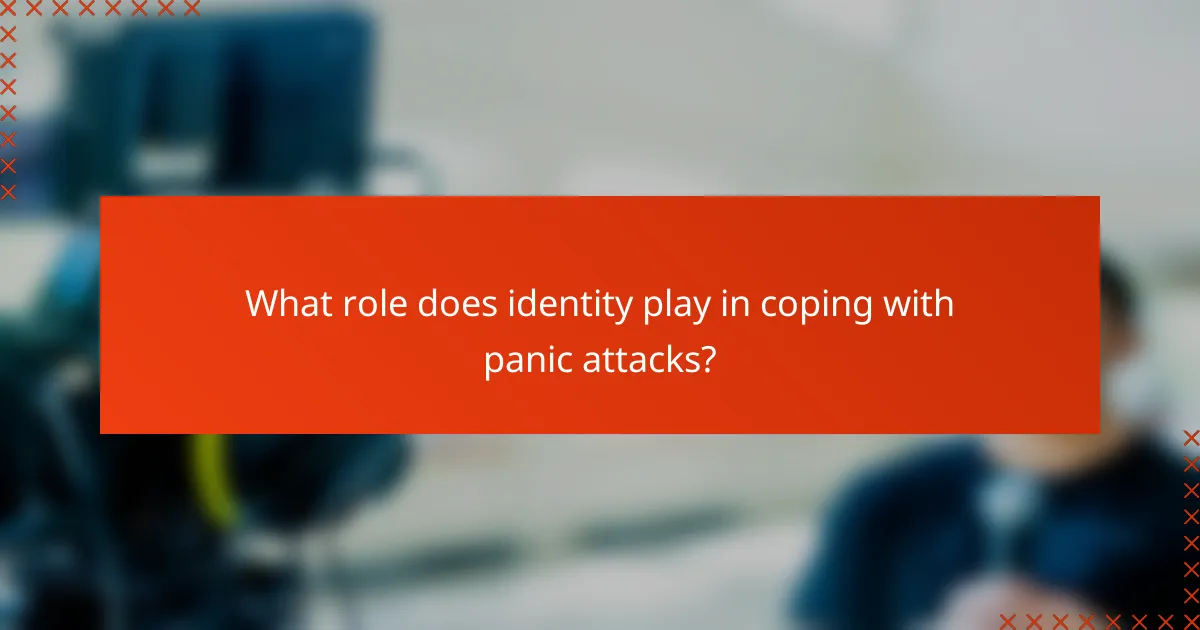
What role does identity play in coping with panic attacks?
Identity significantly influences how individuals cope with panic attacks. A strong sense of self can provide the resilience needed to manage anxiety, while identity shifts may lead to self-esteem issues that complicate recovery.
Understanding coping identity
Coping identity refers to the way individuals perceive themselves in relation to their experiences with panic attacks. It encompasses the strategies and beliefs that shape how one handles stress and anxiety. Recognizing and reinforcing a positive coping identity can enhance one’s ability to manage panic symptoms effectively.
For example, someone who identifies as a “survivor” of panic attacks may approach their experiences with strength and determination, whereas someone who sees themselves as a “victim” may feel more helpless. Shifting this perception can be crucial for recovery.
Shifts in self-identity
Panic attacks can lead to significant shifts in self-identity, often resulting in feelings of inadequacy or fear. Individuals may start to see themselves as anxious or fragile, which can diminish self-esteem. These identity changes can create a cycle where anxiety feeds into negative self-perception, making it harder to cope.
To counteract this, it’s essential to actively work on self-identity. Engaging in positive affirmations, seeking therapy, or joining support groups can help individuals reclaim a more empowering identity, focusing on strengths rather than weaknesses.
Developing resilience
Building resilience is key to coping with panic attacks and maintaining a stable identity. Resilience involves developing skills and strategies to bounce back from stress and adversity. This can include mindfulness practices, cognitive-behavioral techniques, and establishing a supportive network.
Practical steps to enhance resilience include setting realistic goals, practicing self-care, and reflecting on past successes in overcoming challenges. Regularly engaging in these practices can help reinforce a positive self-identity and improve overall coping mechanisms.
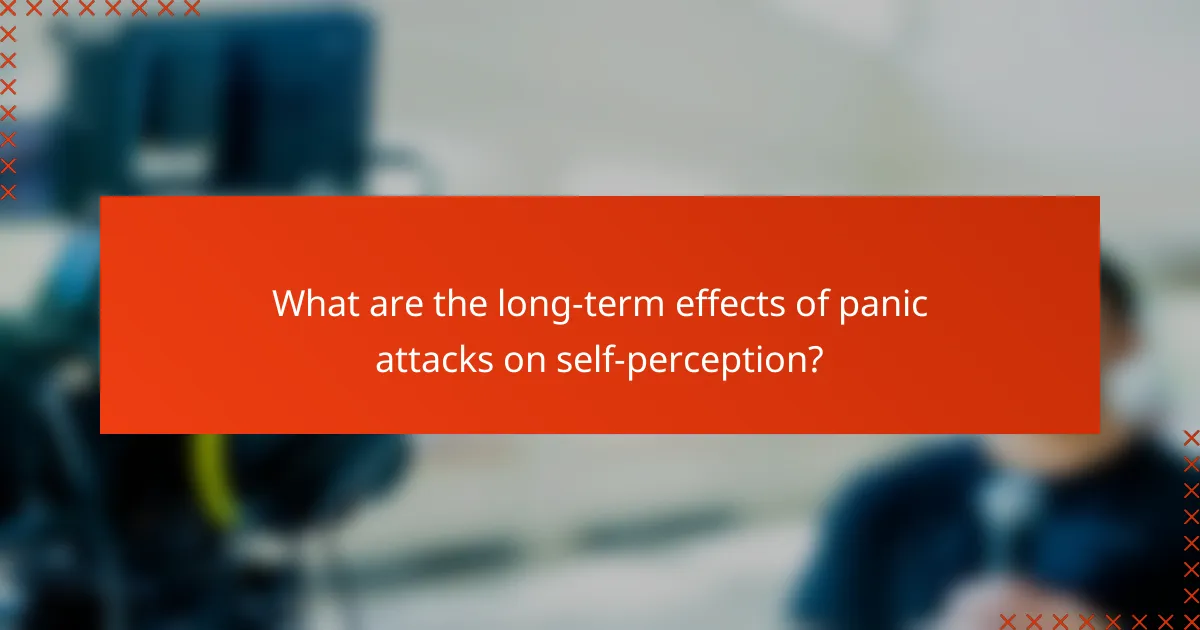
What are the long-term effects of panic attacks on self-perception?
Panic attacks can significantly alter an individual’s self-perception over time, leading to issues with identity and self-esteem. Many people experience a persistent sense of anxiety that can distort how they view themselves and their capabilities.
Chronic anxiety and self-image
Chronic anxiety often leads to a negative self-image, as individuals may start to see themselves as weak or unable to cope with stress. This shift can result in feelings of inadequacy and a lack of confidence in everyday situations. Over time, these perceptions can become ingrained, affecting personal and professional relationships.
People may avoid situations that trigger anxiety, further reinforcing a negative self-image. For instance, someone who fears public speaking might decline opportunities for advancement, which can perpetuate feelings of failure and low self-worth.
Potential for identity crises
Panic attacks can trigger identity crises, where individuals struggle to reconcile their previous self with the person they feel they have become. This dissonance can lead to confusion about one’s values, goals, and overall identity. For example, someone who was once outgoing may become withdrawn, leading to a profound sense of loss regarding their former self.
Such crises can be exacerbated by societal pressures and expectations, making it difficult for individuals to navigate their new reality. They may question their abilities and worth, which can further complicate their sense of identity.
Strategies for long-term recovery
Effective long-term recovery strategies include therapy, mindfulness practices, and support groups. Cognitive-behavioral therapy (CBT) can help individuals reframe negative thoughts and rebuild their self-esteem. Mindfulness techniques, such as meditation and deep breathing, can also reduce anxiety and improve self-awareness.
Engaging with support groups allows individuals to share experiences and learn from others facing similar challenges. This sense of community can foster a more positive self-perception and help individuals feel less isolated in their struggles.
- Practice self-compassion and avoid harsh self-criticism.
- Set small, achievable goals to rebuild confidence.
- Seek professional help when needed to address underlying issues.
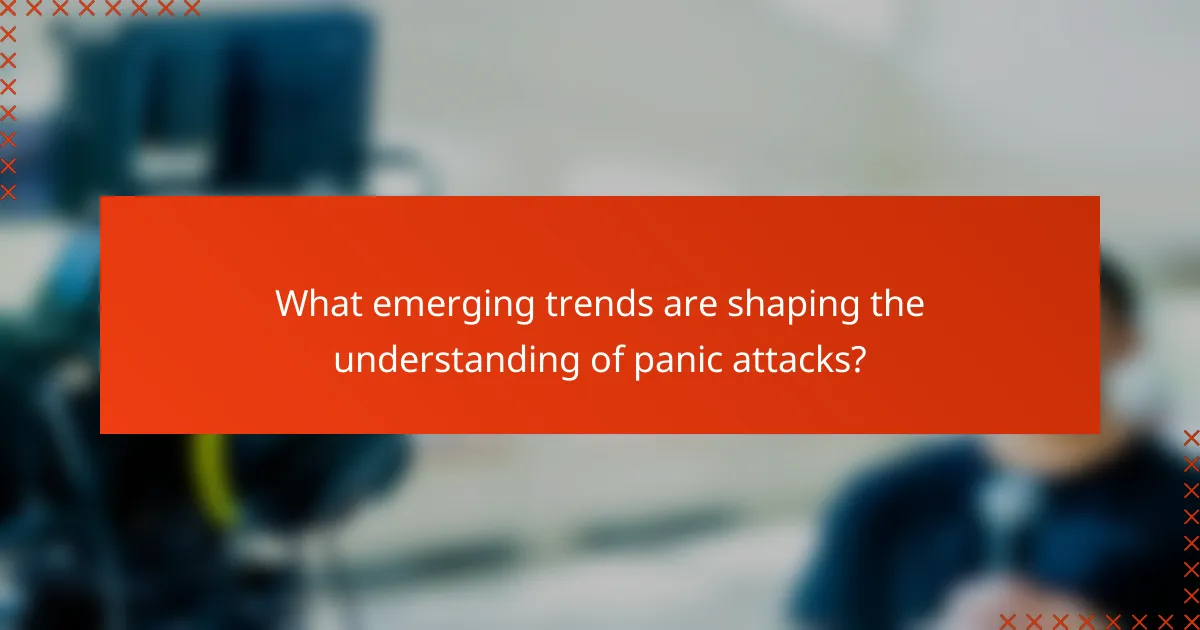
What emerging trends are shaping the understanding of panic attacks?
Recent trends in mental health research are enhancing the understanding of panic attacks, particularly regarding their impact on self-perception. These trends focus on identity shifts, self-esteem issues, and the development of coping identities among individuals experiencing panic attacks.
Identity shifts following panic attacks
Panic attacks can lead to significant identity shifts, as individuals may begin to see themselves through the lens of their experiences. This can manifest as a feeling of being “broken” or “different,” which can alter how they interact with others and perceive their own capabilities.
For example, someone who previously viewed themselves as confident may start to feel insecure or anxious in social situations after experiencing panic attacks. This shift can create a cycle where the fear of future attacks reinforces a negative self-image.
Self-esteem issues related to panic attacks
Self-esteem often suffers in individuals who experience panic attacks. The unpredictability and intensity of these episodes can lead to feelings of inadequacy or failure, particularly if the person feels they cannot control their anxiety.
Many individuals may avoid situations where they previously felt comfortable, further diminishing their self-worth. Recognizing this pattern is crucial for rebuilding self-esteem, as it allows individuals to confront their fears and gradually re-engage with their lives.
Coping identity development
Developing a coping identity is a common response to managing panic attacks. This involves adopting new strategies and perspectives that help individuals navigate their experiences and regain a sense of control.
Effective coping strategies might include mindfulness practices, cognitive-behavioral techniques, or support groups. By embracing these coping mechanisms, individuals can redefine their identity not solely in terms of their panic attacks but as resilient individuals capable of managing their anxiety.
